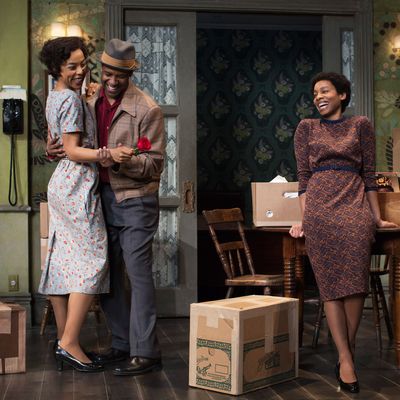
Everyone’s moaning about Denzel Washington’s age: How can a man who’s 59 play the 35-year-old Walter Lee Younger in A Raisin in the Sun, a character whose very name suggests the drama of coming into manhood? And if Walter’s that old, how can his mother, Lena, be played by an actress — LaTanya Richardson Jackson — who is just 64? Did she give birth to him as a tot?
Well, none of that matters. If anything, Washington comes off as no more mature than his character’s pre-adolescent son. His Walter has the caught-in-a-trap itchiness of a teenager. He doesn’t walk but rolls into a room, his loosey-goosey limbs desperately insinuating a joie de vivre his actual living lacks. (He’s a chauffeur.) Washington has always been a very physical actor, locating the essence of a role in his body and in the music of the words, when he could get his mouth around them. (Not so much in Julius Caesar.) Here, in the second Broadway revival of Lorraine Hansberry’s classic, he’s almost dancing the part, especially in a priceless drunk scene that ends with his burlesquing black minstrelsy and all but singing “Mammy.” Even without reference to the previous Broadway Walter — a stuporous Sean Combs — this is an electric performance; you forget about the actor’s age as quickly as you forget, in most plays that are cast color-blind, about race.
Of course, race can’t be forgotten in A Raisin in the Sun. For one thing, when it opened in 1959, it was the first play by a black woman ever to have appeared on Broadway. Hansberry, then just 29, was keenly aware of this, and built it to survive in both the short and long term. Is it ironic that she did so by echoing the theme of segregation in her story structure? Within the walls of the Youngers’ South Side Chicago tenement, a purely domestic drama is taking place, pitting the feckless Walter against his fed-up wife, Ruth, on the one hand, and his going-places sister, Beneatha, on the other. This is a cozy, universal sort of conflict, with a familiar kind of engine: a $10,000 death benefit that god-fearing Lena must decide how to spend. Will she choose Walter’s scheme of opening a liquor store, Beneatha’s plan of attending medical school, or her own (and Ruth’s) oft-deferred dream of a proper one-family home?
In itself, that story could just as well take place in a white or Asian (or mixed-race) household. But outside the Youngers’ tenement, a different drama is brewing, one that’s explicitly about black pride and prejudice and the crushing weight of poverty. Every time the door opens, these devils and difficulties scamper in, like the cockroaches Beneatha fumigates in vain. There’s the conflict of old black vs. new black, introduced by the visits of her polar suitors: the assimilationist George Murchison (Jason Dirden, perfect, with an awesome ’50s fade) and the Nigerian Joseph Asagai (a fine Sean Patrick Thomas), bearing gifts of tribal garments and notions of natural hair. There’s Beneatha’s own awakening to the specifically racial roadblocks in her way to becoming a doctor. And of course there’s Karl Lindner from the Clybourne Park Improvement Association, who pays a visit bearing a check to discourage the Youngers from moving to his all-white neighborhood. David Cromer, trading his usual director’s hat for an actor’s, gets Lindner’s passive-aggression just right: While believably assuring the family he’s after their own good, he does not scruple to call Walter Lee “boy.”
For most of the play, Hansberry keeps the stories quite separate, even while building a pressure that can only be resolved when they meet. Walter will have to confront Lindner, and if he emerges morally victorious, someone’s dreams will nevertheless explode. (Actually, several someones’ dreams will explode; Stephen McKinley Henderson has a heartbreaking cameo as part of the collateral damage.) It’s when the two halves of the drama collide in the final scene that the play’s astonishing full power is released, as both social protest and storytelling. Without the perennially uncomfortable racial element the play wouldn’t be worth reviving, but without the superb craftsmanship of the rest it wouldn’t have lived in the first place.
Kenny Leon’s production (he directed the Combs Raisin as well) takes some extreme positions, not just with Washington’s childish Walter but also with Sophie Okonedo’s concomitantly implacable Ruth. If Okonedo seems implacable even before the play gets started — the curtain rises on her looking out at the audience, both angry and exhausted — the British actress, an Oscar nominee for Hotel Rwanda, makes the choice work, throwing a dead-on American accent into the bargain. On the other hand, Richardson Jackson, having stepped in for Diahann Carroll after rehearsals began, offers a slightly generic and intermittent Lena; still, she comes through with fierce specificity at the key moments. (The slap she gives Beneatha for parading her atheism would give Sartre religion.) And if some scenes do not yet seem fully tuned, most of the time the production locks in on its signal, with an especially persuasive Beneatha in Anika Noni Rose. Rose manages to keep a perfect balance at the border of old and new — and carry off the college-girl skirt and the Ibo head scarf (the superb costumes are by Ann Roth) with equal aplomb.
But the play’s the thing: built like a bomb and relentlessly relevant. Ageless, in fact.
A Raisin in the Sun is at the Ethel Barrymore Theatre through June 15.
*This caption has been change to correctly identify Sophie Okonedo.




